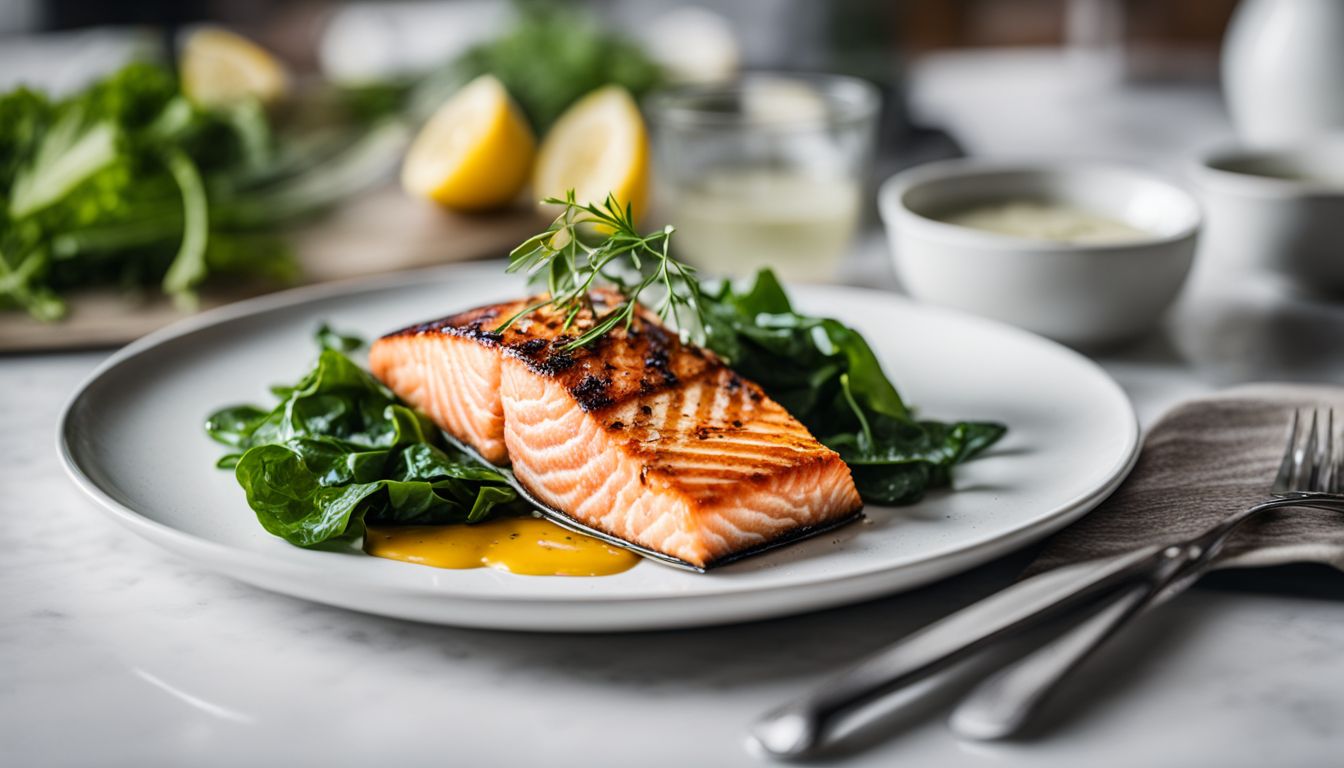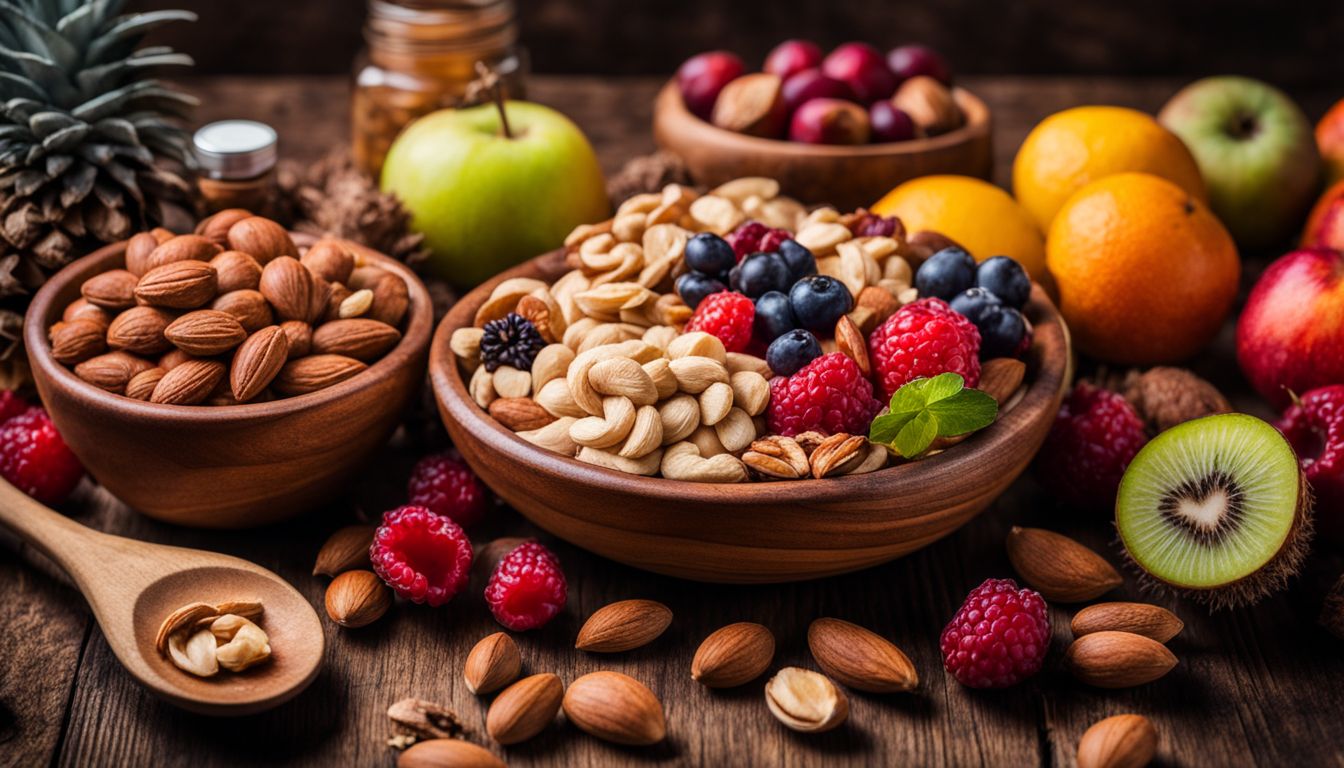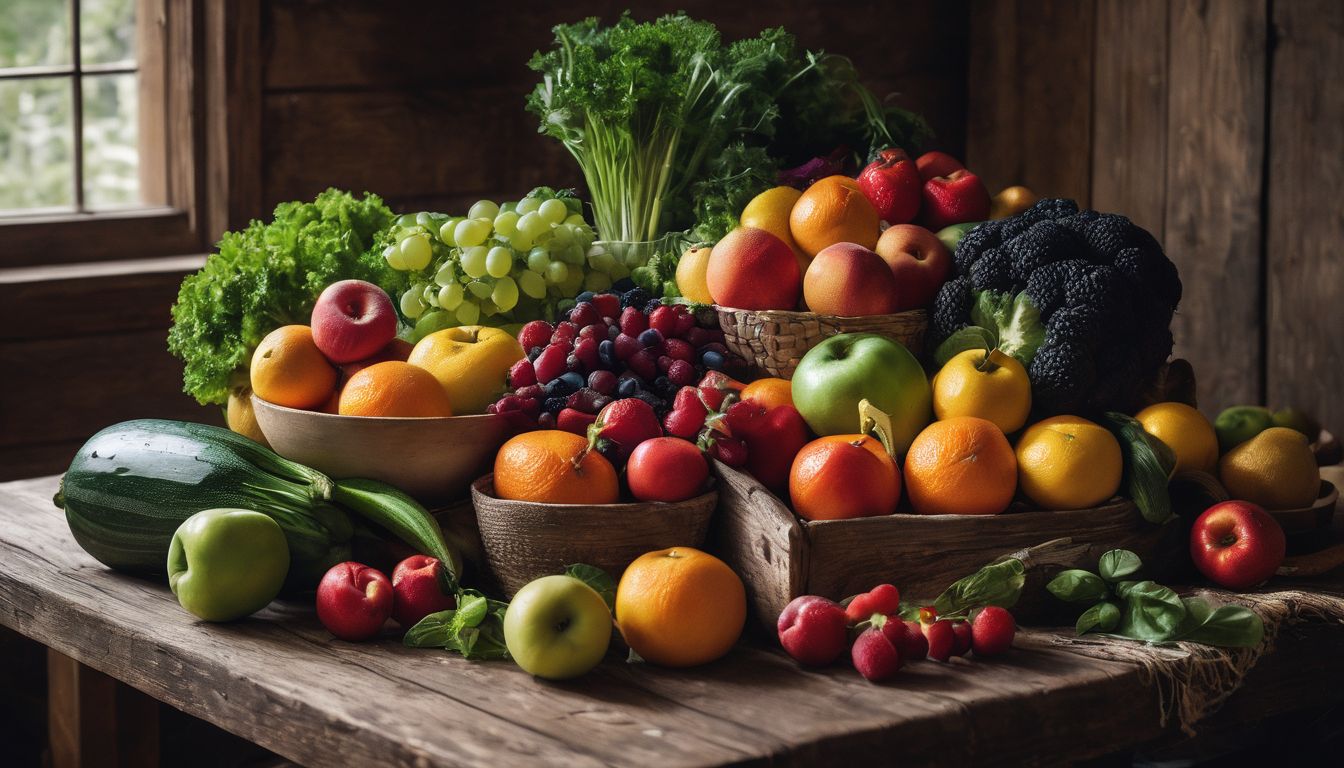Struggling with hair that’s losing its luster and strength can be a real downer. It’s no secret that lush, vibrant hair often starts from the inside out. This article is your guide to a glossier mane, unveiling foods that are not just delicious but also teeming with hair-loving nutrients.
Dive in and discover how your next meal could be the key to unlocking healthier, more radiant hair!
Key Takeaways
- Eating salmon, which is rich in omega – 3 fatty acids and protein, hydrates your scalp and strengthens hair follicles for a fuller mane.
- Including eggs in your diet provides biotin and other essential nutrients that improve hair texture and prevent loss, making them great for maintaining healthy strands.
- Nuts like almonds and walnuts supply key vitamins like E and minerals such as zinc that combat hair thinning while promoting growth.
- Chia seeds are small but mighty when it comes to nourishing the hair with omega – 3s, antioxidants, zinc, and vitamin E for stronger locks.
- Adding legumes such as chickpeas or lentils to meals can boost keratin production due to their high protein content, supporting both hair strength and shine.
Nutritional Value of Salmon for Healthy Hair Growth

Salmon packs a powerful punch for those looking to boost their hair health. This oily fish swims to the top of the list with its high levels of omega-3 fatty acids, which are key in keeping your scalp and hair hydrated.
Omega-3s aren’t produced naturally by your body, so including salmon in your diet is an essential step towards lush locks. Not only do these healthy fats promote a glossy mane, but they also reduce inflammation that can lead to hair loss.
Chowing down on salmon can also shore up your strands from the inside out. It’s teeming with protein, the building block of every single hair on your head. Without enough protein from foods like salmon, you might notice your hair becoming brittle or weak over time—and nobody wants that! Plus, this fish is loaded with selenium and vitamin D3 which work together to support healthy follicle growth.
With regular consumption, you’re not just eating for the taste—you’re dining on one of nature’s best supplements for strong and vibrant hair growth.
Advantages of Eggs for Hair Health

Eggs provide a powerhouse of nutrition that directly benefits hair health, particularly for those battling hair loss. Rich in protein, eggs are fundamental to building the keratin that strengthens each strand and prevents breakage.
Biotin, another key component found abundantly in eggs, helps in preventing hair loss by improving the body’s keratin infrastructure. Regular consumption of eggs can lead to noticeable improvements in hair texture and growth.
Incorporating eggs into your diet supports not just the follicles but also nourishes the scalp itself. Omega-3 fatty acids and vitamins A & E, present in eggs, enhance blood circulation to the scalp and assist in cellular repair.
This increased blood flow ensures vital nutrients reach your hair follicles more efficiently. Zinc within these versatile ingredients aids in cell regeneration which is crucial for maintaining healthy growth cycles of your mane.
The proteins and micronutrients from this simple yet nutritious food ensure that individuals facing thinning locks have a delicious tool at their disposal for managing their condition.
Nuts: An Essential Ingredient for Vibrant Mane

Nuts pack a punch when it comes to battling hair loss. Their high content of omega-3 fatty acids, zinc, and vitamin E works together to strengthen hair follicles, ensuring your mane stays lush and full.
Almonds, for instance, are not just tasty snacks but also hair heroes that can help keep bald patches at bay by nourishing the scalp with their vital nutrients.
Adding a variety of nuts like walnuts and Brazil nuts to your diet is an easy way to make sure you’re getting enough of these essential vitamins and minerals. They don’t just improve your hair’s texture but also contribute significantly to its growth.
Sardines: A Seafood for Strong Hair

Sardines pack a powerful punch for those struggling with hair loss. These small fish are swimming with omega-3 fatty acids, critical components in the battle for a healthy scalp and strong hair.
Omega-3s work to reduce inflammation, which can lead to healthier hair follicles and less shedding. They also provide an excellent source of protein — the building block of every strand on your head.
Adding sardines to your diet can be a game-changer for your mane. These tiny seafood giants come loaded with nutrients like vitamin D and calcium, supporting not just bone health but also the integrity of your hair structure.
With regular consumption, sardines help ensure that essential vitamins and minerals reach your roots, providing them with the nourishment needed for robust growth and resilience against breakage.
Chia Seeds: A Superfood for Hair Enhancement
Chia seeds are a powerhouse of omega-3 fatty acids, vital for promoting healthy and robust hair. Packed with zinc and vitamin E, they nourish the hair from within, supplying essential nutrients to support strong and shiny hair.
In addition, chia seeds are rich in antioxidants that shield hair follicles from damage and encourage new growth. These nutrient-packed seeds can be easily integrated into everyday meals by adding them to yogurt or smoothies as part of a balanced diet for maintaining healthy hair.
Incorporating chia seeds into your diet provides a valuable source of protein that aids in promoting natural hair growth and strength. Whether sprinkled over salads or added to oatmeal, these versatile superfoods offer an easy way to enhance overall hair health through their wealth of beneficial nutrients.
Pumpkin: A Seasonal Food for Hair Health
Pumpkin boasts essential nutrients like vitamin A, C, and E, iron, and beta-carotene crucial for hair health. Regular consumption can foster hair growth and combat loss while fostering a healthy scalp.
These nutrients also support overall skin health. With its versatility in preparation methods, pumpkin becomes an easy inclusion in a balanced diet to improve the overall appearance and strength of hair.
Entailing practical advice within a myth-busting approach, incorporating pumpkin into one’s diet offers an actionable step toward optimal hair health.
Avocado: A Fruit Full of Vitamins for Hair Growth
Avocado, rich in vitamins E and C, is packed with healthy fats that promote scalp health and hydration. It is a top food choice for maintaining healthy hair due to its essential nutrients and benefits.
By incorporating avocado into your regular diet, you can nourish your hair from within and maintain its strength and vibrancy.
Consuming avocado regularly as part of a balanced diet can significantly contribute to promoting overall hair health. With its nutrient-packed profile, incorporating this fruit into your meals can help support the vitality of your mane.
Next up, let’s explore the benefits of buckwheat for nourishing hair growth.
Buckwheat: A Grain for Hair Nourishment
Buckwheat is loaded with silica, a mineral crucial for preventing hair thinning and enhancing hair strength. By including buckwheat in your diet, you can supply your body with essential nutrients like antioxidants and fiber that support healthy hair growth.
Its inclusion in a balanced diet can prevent deficiencies that might lead to hair loss. Furthermore, buckwheat’s nutrient content contributes not only to overall health but also specifically benefits hair health and growth.
Moreover, consuming buckwheat provides the body with vital nutrients necessary for promoting healthy hair growth while also preventing deficiencies linked to hair thinning and loss.
Legumes: Chickpeas, Lentils, Beans and Peas for Hair Strength
Chickpeas, lentils, beans, and peas are rich in protein, iron, zinc, and biotin – all crucial for maintaining healthy hair. These legumes contain amino acids that support the production of keratin, the essential protein responsible for hair strength and structure.
Including legumes in your diet can help prevent hair loss and promote stronger, shinier hair due to their high nutrient content.
In addition to being a great source of plant-based protein, these legumes also offer an array of vitamins and minerals necessary for overall hair health.
Plain Greek Yogurt: A Dairy Product for Hair Shine
Greek yogurt offers high levels of protein and vitamin B5, contributing to preventing hair thinning and loss. These nutrients are essential for enhancing hair strength and growth, making Greek yogurt a valuable addition to one’s diet.
Consuming Greek yogurt as part of a balanced diet can significantly promote hair shine and overall hair health. Its high protein content plays a crucial role in maintaining vibrant and healthy hair.
The vitamin B5 present in Greek yogurt may help prevent hair thinning and loss, further emphasizing its significance as a dairy product for fostering healthy hair growth. Including this nutrient-rich food in your regular meals can have positive effects on the health and appearance of your mane.
Next – 12. The Role of Whole Foods in Hair Health Versus Supplements.
The Role of Whole Foods in Hair Health Versus Supplements
Transitioning from the benefits of plain Greek yogurt to the role of whole foods versus supplements in hair health, it’s essential to understand the distinct advantages each approach offers.
Whole foods, such as fruits, vegetables, lean proteins, and healthy fats, provide a rich source of vitamins, minerals, and antioxidants that support overall well-being. These nutrients contribute to strong and vibrant hair by nourishing the scalp and promoting optimal hair growth.
Supplements can be beneficial for individuals with specific deficiencies or those who struggle to obtain essential nutrients from their diet alone. However, they should not be viewed as a replacement for whole foods but rather as a complement to ensure adequate intake of certain key nutrients like vitamin D and omega-3 fatty acids.
It’s crucial to prioritize a balanced diet rich in whole foods while also being mindful of any specific nutritional gaps that may require targeted supplementation for optimal hair health.
Conclusion
In conclusion, the key to healthy and vibrant hair lies in the foods we eat. Consuming a variety of nutrient-rich foods like salmon, eggs, nuts, seeds, and avocados can promote hair growth and strength.
By incorporating these foods into your diet regularly, you can nourish your hair from within and maintain its health and vitality. Embracing a whole-food approach with an emphasis on essential vitamins and minerals will help you achieve luscious locks that reflect your overall well-being.
FAQs
1. What foods will give my hair a healthy boost?
Eating flaxseeds, spinach, and fatty fish that are rich in omega-3, vitamins B12 and E can strengthen your hair. Including these food sources in your diet supports vibrant hair.
2. Can improving my diet really help with hair growth?
Yes! Nutrient-packed foods like soybeans, black beans, and whole grains provide essential fatty acids, iron, and vitamin C which are crucial for promoting the anagen phase of hair growth.
3. Are there any particular vitamins I should focus on for healthier hair?
Focus on getting plenty of vitamin A from pumpkins or carrots and B-complex vitamins found in eggs yolk to maintain good scalp health and reduce oxidative stress affecting your mane.
4. What if I’m vegetarian? How do I keep my hair strong without eating meat?
Vegetarians can enjoy similar benefits by including pulses, berries containing vitamin C, and ground flaxseed as staples in their diets to provide the necessary nutrients for keeping their nails, bones, and especially their hair healthy.
5. Is there a downside to poor nutrition when it comes to my hair’s health?
Poor nutrition can lead to several issues like type 2 diabetes or cardiovascular disease; but specific to your mane’s well-being it could cause iron deficiencies resulting in weakened strands susceptible to conditions like alopecia.
6. Should someone with dietary restrictions consult a professional before making changes?
People with special dietary needs due to conditions like Crohn’s disease or those breastfeeding should seek advice from registered dietitians or personal trainers who understand how nutrition affects gut flora and overall health.
